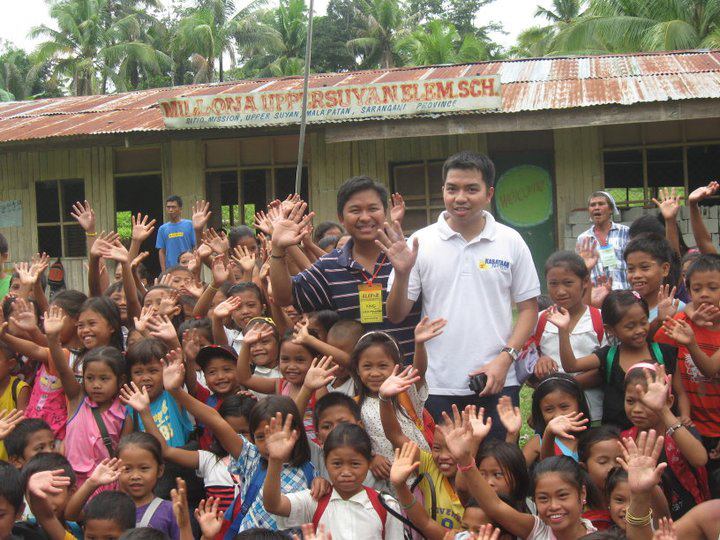Across Rivers, Atop Mountains: A Constituency Unreachable via Internet
Mong Palatino is an activist who represented the youth sector in the Philippine Congress for two terms. He is Southeast Asia Editor of Global Voices.

Three hours across a river highway, Mong Palatino reached this upland village in Malapatan, Sarangani in January 2012 (Photo shared by Mong)
What are the duties of a party list legislator? Draft laws, participate in plenary debates, and yes, even climb mountains.
A lawmaker’s job is to articulate the demands of a constituency. Therefore, a lawmaker must regularly consult his people. In the context of a Third World agrarian archipelago like the Philippines, this means reaching out to villages living in remote hinterlands, small islands surrounded by active volcanoes, and even flooded river valleys.
Ideally, we could maximize Internet tools to connect the rural and the urban. Connectivity is increasing, but we cannot deny that a significant part of our population is still disconnected from wireless or even dial-up technologies.
Crowd-sourcing must be interpreted literally. In other words, citizens must still be physically gathered in an assembly where they can freely express their opinions. A lawmaker must sometimes cross hanging bridges, dirt roads and mountain trails to be present in these assemblies.
In the past four years, I had the privilege of attending numerous community meetings organized by students, farmers, fisherfolk, workers and indigenous peoples. I went to coastal barangays (villages), day care centers, reclamation sites, land reform zones and protest camps of striking workers. It was truly a marvelous experience to see the majestic islands of the Philippines; but it was also heartbreaking to witness the inhumanity of numbing poverty in both the countryside and Mega Manila.
Through my participation in these assemblies, I felt as if I was enrolled in massive, open offline courses on Philippine geography, social history, public administration and political science. They reveal what official government reports are excluding. They are testimonies of policy failures. At the same time, they provide a glimpse of grassroots democracy in action.
My most memorable non-official function was a trip I made to Sarangani in 2011. Located in the southernmost island of the country, Sarangani is famously represented in Congress by world boxing champion Manny Pacquiao. It’s a poor province, yet blessed with abundant resources. It’s situated in the country’s tuna capital region and parts of the province are said to contain one of the largest gold deposits in the world.
Perhaps because of intensified mining activities, there is a military occupation in many villages to secure mining operations. The immediate impact was the deployment of troops in upland villages that negatively affected the lives of B’laan tribal communities, including the schooling of children.
I was invited by a non-governmental organization to visit a school taken over by the military in the municipality of Malapatan and to help deliver medical and food supplies in the area. After traversing a ‘river highway’ for three hours, we arrived in the upland village. The village chief was close to tears when he told me that I was the first member of Congress and the highest official of the land who had visited their region.
“The vehicle we used to cross a ‘river highway’ to reach Upper Suyan, Malapatan, Sarangani” January 2012. (Shared by Mong)
Indeed, the location is so remote that it’s not even included in the map of the municipality. Another part of the village can only be reached after trekking for more than five hours.
I saw the dilapidated conditions of the school. I met the teachers who expressed their frustration about the absence of vital social services in the village. I got the chance to interact with B’laan students. Later, I learned from the provincial education authorities that the situation in Malapatan is almost the same in other upland towns of the province.
This exposure inspired me to be more aggressive in Congress in demanding more funds for provincial public schools. It reminded me that the fundamental solution in addressing the crisis of Philippine education is to provide the basics of primary schooling: more investments for teachers, infrastructure and student support. But beyond these demands, I realized too that education reforms would be rendered meaningless if not accompanied by concrete poverty eradication measures.
The world may be advancing thanks to the wonders of IT but there are local spaces whose need for connectivity is not directly related to the Internet or social media. Indeed, a request for Wi-Fi connection would be quite laughable in a waterless community.
My term in Congress has ended but I continue to think about the upland village I visited in Sarangani. As legislator and politician, I admit my failure to provide direct and sustained assistance to the village residents, especially the children. But as an activist, my work continues and I am happy that I am joined by friends and strangers in the continuing struggle to end inequality, injustice and oppression in the world.